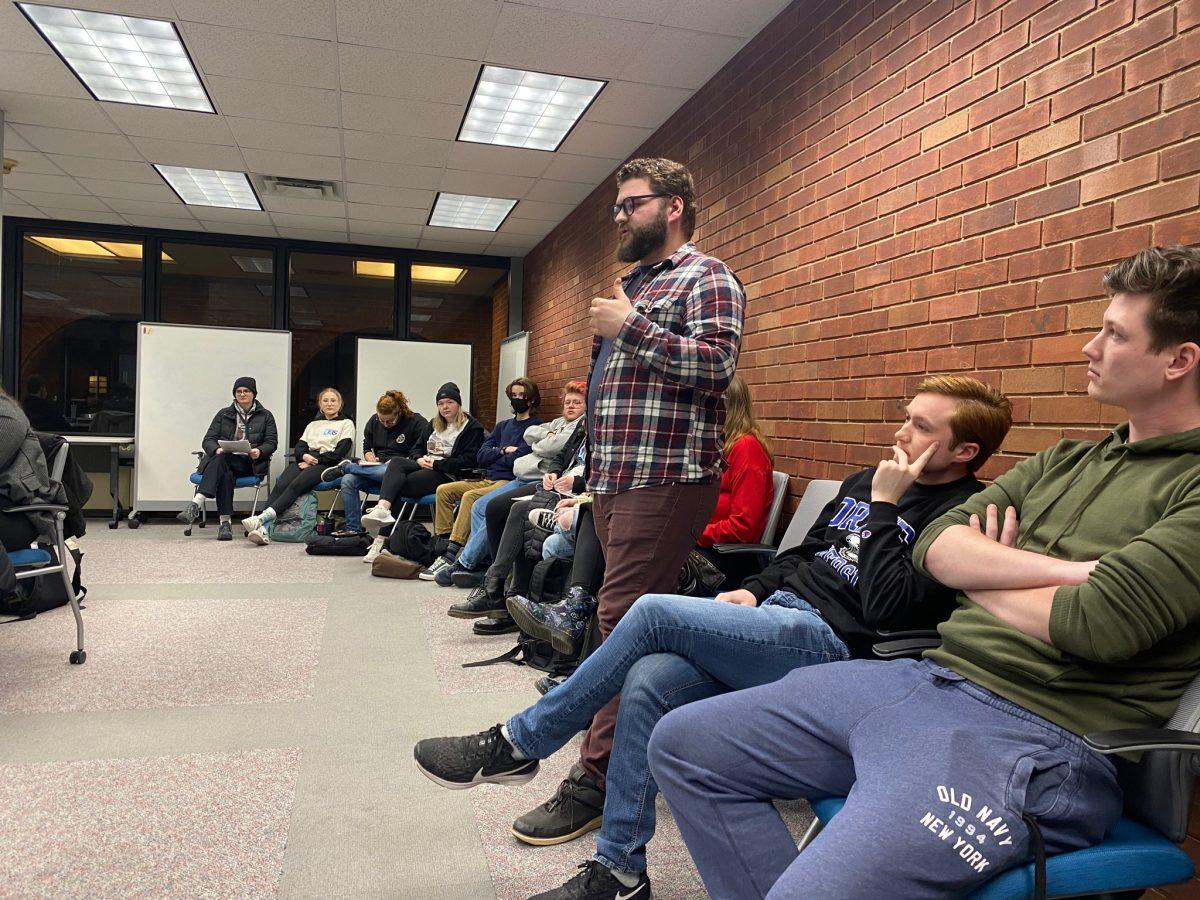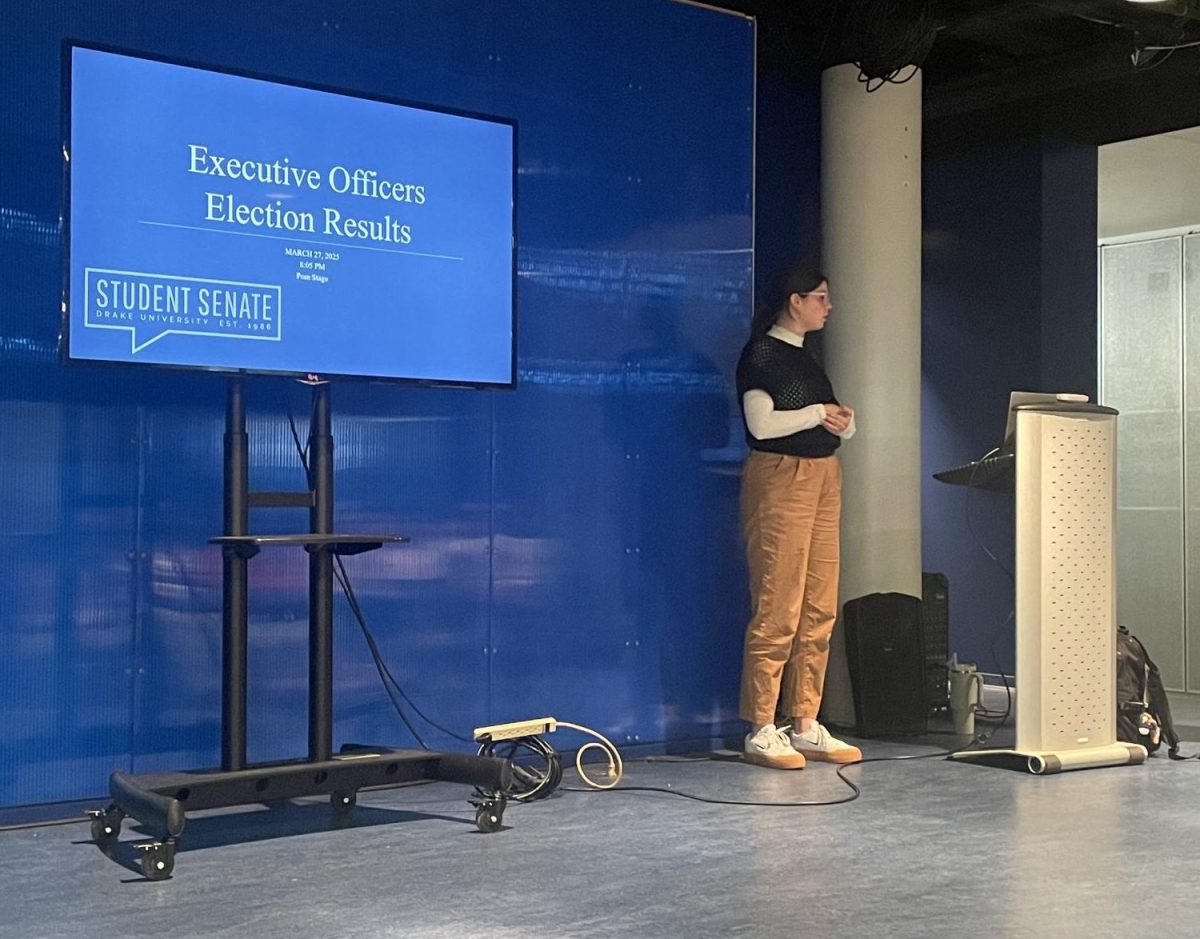Members of Drake’s student media organizations attended the Feb. 23 meeting of the Student Senate to show support for a proposed doubling of the student media fee. The increase would address the Board of Student Communications’ current financial challenges and calls from student publication employees for a new pay structure.
School of Journalism and Mass Communication academic senator and co-chair of the BSC Gannon Henry proposed a plan to the senate that would increase the yearly fee from $37.75 to $75.50. While the plan was discussed in the senate’s closed-door Elected Assembly on Feb. 22, the fee increase was not included in the agenda for the Feb. 23 meeting.
“The proposal to increase the student media fee wasn’t brought up at the Senate’s meeting on Feb. 23 partially because I didn’t have time to draft the motion and get it on the agenda, but primarily because it wouldn’t have done any good,” Henry said. “The other members of Senate are still working to gather an understanding of the situation and gauge how the general student body feels, so calling a vote at that time would have been counterproductive.”
Any fee change approved by both the BSC and Student Senate requires final approval from the Board of Trustees. Drake administration told the Student Senate that the Board of Trustees can only approve alterations to fees in their January meeting, according to Student Body President Connor Oetzmann.
“The administration is telling us currently right now that there is no way for a fee increase to [take effect] in the fall of 2023,” Oetzmann said at the Feb. 23 meeting.
Before public comments for the meeting began, the senate passed a motion from Vice President of Student Organizations Trinity Harris, which limited comments to six speakers with no more than two minutes each.
At the start of the meeting, Oetzmann stated that while the student media fee was not being discussed at the meeting, the senate supported the student media organizations.
“I speak for the entire Senate and I will say that we’re not going to let the publications die,” Oetzmann said. “We will do what we can to make sure that the publications still have adequate funding for this next academic year and make sure that we’re advocating for an increase the following year [fall of 2024]. ”
The student media fee is part of the $178 student activity fee paid by students each year. All funds from the student media fee go to the BSC, a joint committee of the Faculty and Student Senates. The BSC oversees the Drake Broadcasting System, Drake Magazine, Drake Political Review, DUiN Magazine, Periphery Art and Literary Journal and The Times-Delphic.
The student media fee was last increased in 2014, according to BSC Faculty Co-Chair Jeff Inman. Since then, student enrollment has declined, reducing the revenue from the fee. During the same period of time, the cost of running student publications has increased significantly.
Inman stated that printing costs have doubled due to inflation and new publications have brought on more staff members. As a result, the budget of the BSC is higher than the amount of funds the media fee has brought in. Currently, the BSC is using funds from its reserve to continue operating each semester.
“If our printing costs are the same this semester as they were last semester, we are running a roughly $24,000 deficit,” Inman said.
At the same time, Henry believes that the current BSC pay structure is flawed. Publication staff are paid the campus minimum wage of $8 per hour, but they are told to log a certain number of hours per week regardless of the actual hours of work done.
The BSC used to pay students in stipends, but a change in federal law required the board to change the pay system starting in the 2016-2017 school year, Inman said. The current hourly structure pays students about as much as the old stipend system but requires students to log inaccurate hours.
Henry believes this does not align with the Fair Labor Standards Act, which requires employees to be paid for actual hours worked. After talking in depth with three student media organizations, he came to the conclusion that to meet those standards. The fee would need to be doubled.
“I’ve run the numbers alongside comparisons to our past numbers and tried to get us the most accurate number possible and it’s looking like we would essentially have to be doubling our fee,” Henry said. “Right now we are paying people significantly less than that which is required under federal labor standards.”
Whether a fee increase is or isn’t approved this semester, an evaluation of the fee will occur next year. Under the bylaws and Policy Document of the BSC, every five years, a six-person panel with equal representation from the Student Senate, Faculty Senate and the BSC conducts a review of the BSC budget, operating costs, and the student media fee to determine if the fee should be changed.
Henry provided The Times Delphic with a spreadsheet detailing his calculations. The Times-Delphic is working to independently verify the accuracy of its contents but had not done so before the publication of this story.
The Student Senate’s Vice President of Student Organizations Trinity Harris and Senator at Large for Health and Safety Breckyn Lyons both declined to comment on this story.










